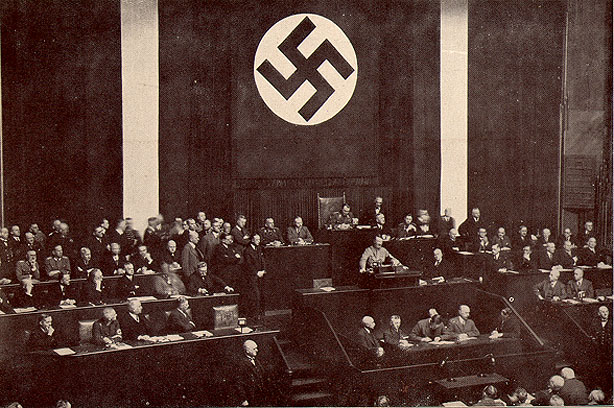By: Inoljt, http://mypolitikal.com/
In modern society the name Adolf Hitler is synonymous for evil. As the perpetrator of the greatest crime of this century and its most destructive war, Mr. Hitler well deserves this reputation.
Yet too often in speaking of Adolf Hitler people forget the man and see only the legend he has become. Hitler, after all, gained power as a politician in a democratic Germany. He played the game of compromises, elections, and leverage that all politicians play. Indeed, Hitler was quite adept at politics; without his skill the National Socialists would have remained a fringe party like so many others
Take the Enabling Act of 1933, the law which effectively turned a semi-democratic Germany into a one-party dictatorship.
More below.
It essentially shifted all power – the ability to make laws, most importantly – from the legislative Reichstag (Germany’s parliament) to Germany’s executive government (Hitler, in other words). One clause, for instance, read:
Treaties of the Reich with foreign states which affect matters of Reich legislation shall not require the approval of the bodies of the legislature. The government of the Reich shall issue the regulations required for the execution of such treaties.
In getting this law passed Hitler could not merely declare his will and have all Germany follow; there were still checks against his power at that time. Because the Enabling Act modified the Germany’s constitution, it required a two-thirds majority in parliament. At the time the Nazis only controlled 288 out of 647 seats (under semi-free elections taken during the same month of March). Moreover, the Social Democrats and Communists – which together held almost one-third of parliament’s seats – were adamantly opposed to the Enabling Act. If Hitler was to pass his law, he would have to tread a very fine needle.
Events, however, had provided a useful tool for Hitler to wipe out his political opposition. A month before, in February 1933, unidentified arsonists set fire to the Reichstag, Germany’s parliament (today many suspect the Nazis themselves as culpable). Placing blame on the Communist Party, Hitler had passed an emergency decree eliminating civil liberties. Communist representatives in parliament were summarily jailed, prevented from voting against the Enabling Act.
Several other factors helped Hitler. The influential Catholic Centre Party agreed to support the Enabling Act; in return Hitler promised to protect the Catholic Church. Intimation was present: on the day of the vote Nazi Brown-shirts surrounded the legislature, chanting “Give us the Enabling Act or there will be another fire!” A number were present inside the building, armed and in full uniform, as voting proceeded.
In the end, the vote was 441 in favor, 94 against. On March 23rd, 1933 the Reichstag voted itself out of existence.
All in all, the Hitler portrayed here is quite different from the evil caricature. One sees a clever and ruthless politician, not a madman. Watching Hitler the politician makes the myth more mundane, but it also paints a more accurate picture of events as they were.
